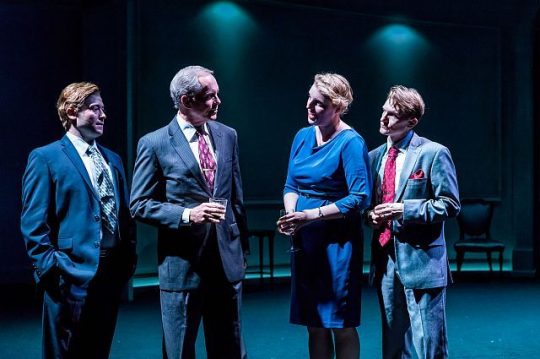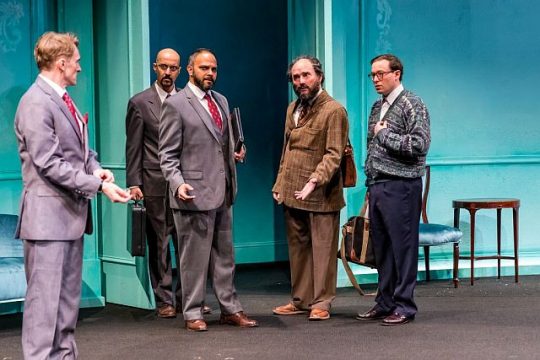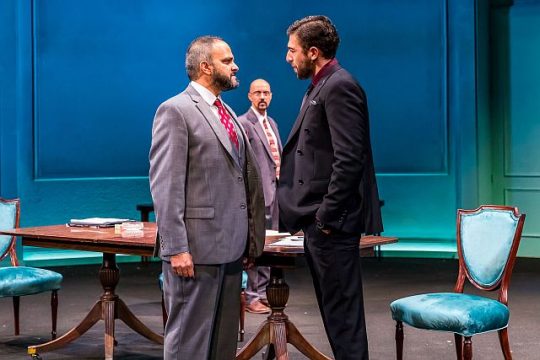
4 stars
TV viewers saw Israeli Prime Minister Yitzhak Rabin shake hands with Palestine Liberation Organization (PLO) leader Yasser Arafat in 1993. The momentous event took place on the White House lawn in Washington D.C. But what led to that famous meeting were the previous, mostly off-the record, mostly unofficial negotiations taking place earlier that year in Oslo, Norway.
What “Oslo,” the multi-award-winning play by J. T. Rogers does is take audiences into the apartment of husband-wife Mona Juul, a diplomat, and Terje Rod Larsen, a university institute’s social scientist, who together initiated the process, and into Juul’s phone conversations with Norwegian Minister of Foreign Affairs Jorgen Holst and Deputy Foreign Minister Jan Egeland.
Through somewhat fictionalized conversations of actual meetings, Rogers builds suspense as the process moves from one level to the next with the action continuing in behind-the scenes discussions at an out-of-the public eye Norwegian manor.

PLO negotiator Almed Qureir (Abu Ala) and associate argue their points with Israel’s advance team, a couple of econ savvy university professorsm Yossi Beilin and Yair Hirscheld, with historian/journalist Ron Pundak Peres Center for Peace Director involved in the negotiations.
Tension continues to climb when negotiations are advanced as Uri ‘Savir, former Israeli Foreign Ministry Director General becomes the official head of team. It then moves forward when Israeli Foreign Minister Shimon Peres officially steps in.
The cast, all veterans of Chicago, regional and national stages, is outstanding. However shout outs have to go to Bri Sudia whose sensible but passionate portrayal of Juul effortlessly glides from serious to charming to comic and to Scott Parkinson who as facilitator Rød-Larsen has the difficult task of making everyone else look good.
Rogers cleverly starts the narrative when Juul- and Rød-Larsen are entertaining Holst, her boss who is about to become Norway’s foreign secretary. Two phones ring, and in a funny phone-switching motion duet that only Bri could pull-off Carol Burnett-style, the couple accidently, on purpose let Holst know they are communicating with Israeli and PLO representatives interested in a peace process.

And so the back-story begins of how peace accords were obtained in Oslo.
The show, which won the Tony, Drama Desk, Obie and other awards for Best Play, came about because Rogers who is interested in people-changing, world-event struggle stories, met Rød-Larsen and learned of his Oslo negotiations role. Rogers had penned his “Blood and Gifts” about Afghanistan in 2011.
Now, “Oslo,” perceptively directed by Timeline founder Nick Bowling, is having its Chicago premiere as a Timeline production at the Broadway Playhouse,
facilitated by Broadway in Chicago. At almost three hours, the show is long but its material is fascinating. Do take time to see the news and document copies in the lobby during intermission.
DETAILS: “Oslo,” a Timeline production, is at Broadway Playhouse, 175 E. Chestnut St..,Chicago, through Oct. 20, 2019. Running time: 2 hours, 45 minutes with one intermission. For tickets or more information visit Broadway in Chicago or Timeline Theatre Company.
Jodie Jacobs
For more shows visit Theatre in Chicago
